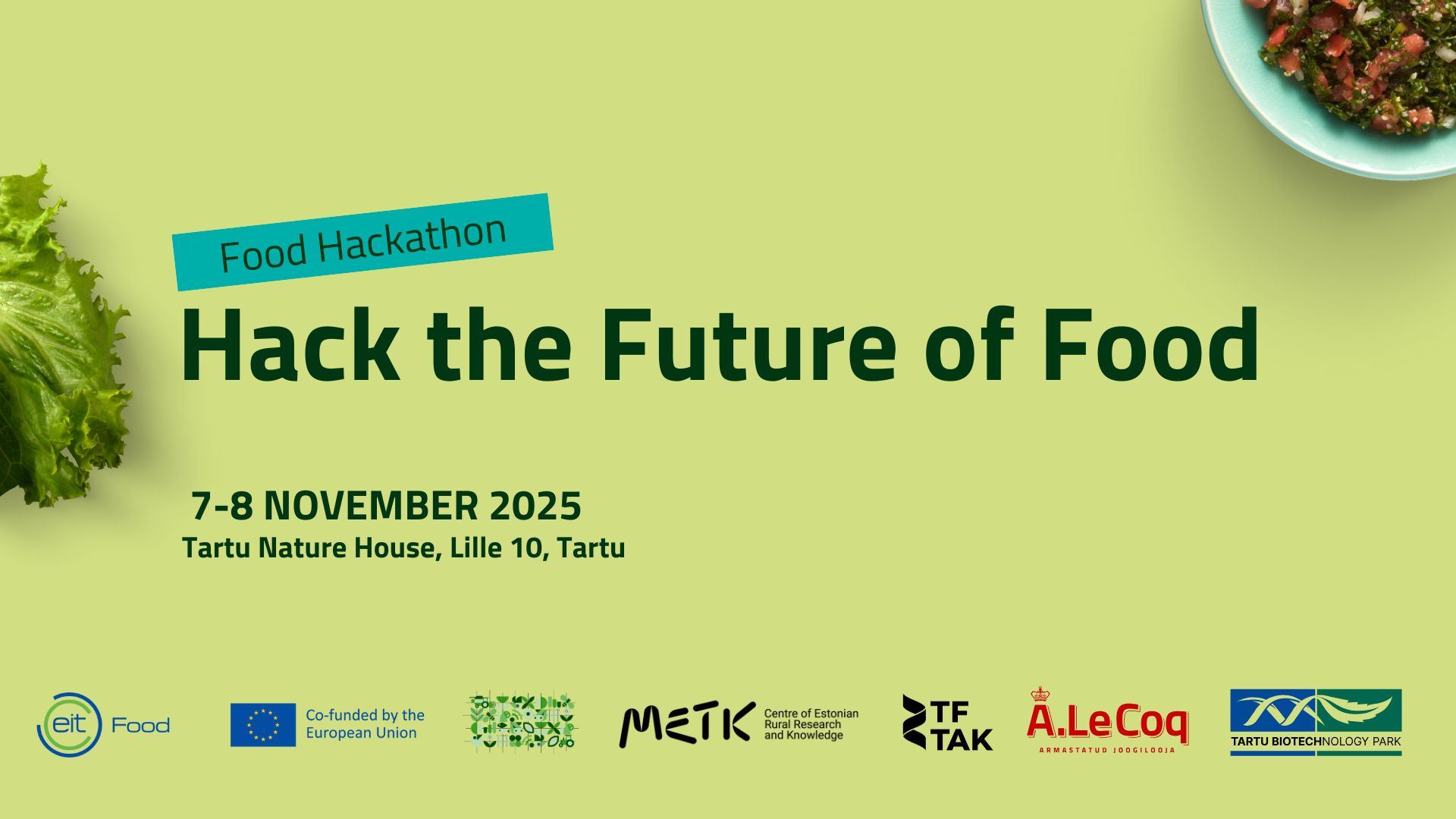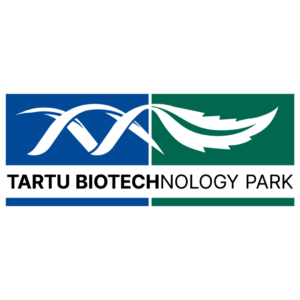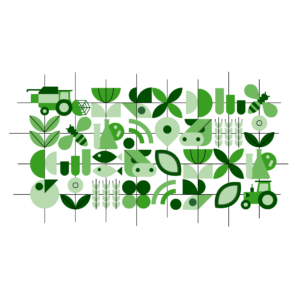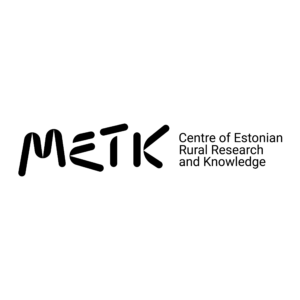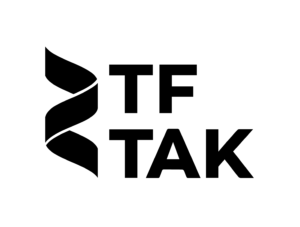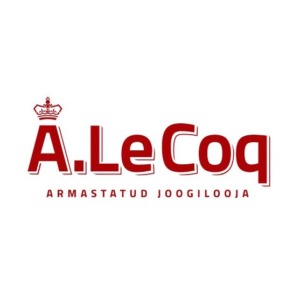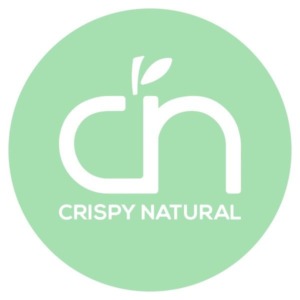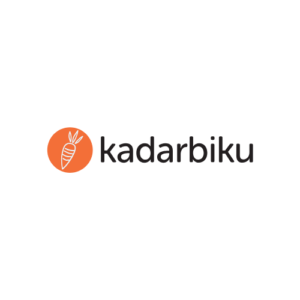🚀 Are you passionate about food?
Join our hackathon, where we bridge the gap between science and business using design thinking methods to develop potential business solutions in the food and agriculture sectors. The hackathon aims to address real-world problems and create solutions that could be implemented in real life.
Over two exciting days, we will bring together students, startups, researchers, and food enthusiasts to ideate, co-create, and prototype the future of food. Expect inspiring keynote, hands-on teamwork, and plenty of networking opportunities.
📅 When? November 7-8, 2025
📍 Where? Tartu Nature House, Lille 10, Tartu
👉Register here: https://forms.gle/ZWsmqP3owenrcf9SA
🌱 Why join?
🎁 Tackle critical food-related challenges
🧠 Hands-on experience solving real-life problems
🎨 Design thinking and pitch training
🎤 Inspirational speaker
🌐 Networking with like-minded people
🏆 EIT Food & partner prizes:
- Cash prize pool of 1,000 € and an opportunity to take part in EIT Food’s business support programs
- Consultation worth 500 € from TFTAK
- Exclusive 1.5-hour tour with experts in METK – Centre of Estonian Rural Research and Knowledge’s laboratories
- 5 crates of assorted drinks from A. Le Coq
💡You can bring your own idea or choose a challenge A. Le Coq, METK and TFTAK provided from below.
Challenges from A. Le Coq:
1. Valorization of Brewer’s Spent Grain
Problem: Beer production leaves behind brewer’s spent grain. Today, it is used mainly as part of dairy cattle feed.
Solution: Develop a technological solution that enables valorization of Brewer’s Spent Grain so it can be used as an input in the cellulose industry.
2. Valorization of Brewer’s Yeast
Problem: Beer production leaves behind surplus brewer’s yeast.
Solution: Develop a technological solution for industrial-scale extraction of nutrients from brewer’s yeast, to be used in the food and feed industries, or in agriculture as fertilizer or pest control.
3. Valorization of Brewer’s Yeast and Spent Grain
Problem: Beer production leaves behind both yeast and spent grain.
Solution: Develop a technological solution to ferment a (dried) yeast–spent grain mix into biogas.
4. Verification of Packaging Designs According to EU Laws
Problem: Checking packaging design compliance with European Union laws and trademark protection is time-consuming and currently performed manually.
Solution: Create an automated tool that analyzes packaging designs and provides quick feedback on their compliance with laws and registered trademarks.
Challenges from METK:
1. AI-Based Crop Disease Detection and Prevention
Problem: Crop diseases can destroy large harvests, leading to food shortages and economic damage.
Expectation: Develop an AI-based system that uses data from drones and satellites to detect early signs of diseases in crops in real-time, offering precise preventive treatments. This reduces pesticide use and supports sustainability.
2. Fully Automated Vertical Farms
Problem: Urbanization is reducing the land available for traditional farming.
Expectation: Design a system of vertical farms powered by AI and robotics, which enables food production in urban environments on smaller areas of land, using fewer resources such as water and energy.
3. Carbon Footprint Reduction Tools for Farmers
Problem: Farmers need tools to measure and reduce their CO2 emissions.
Expectation: Design a carbon footprint tracking platform that provides real-time data and practical solutions to reduce carbon emissions in production processes, such as optimizing fertilization and fuel usage.
4. Agricultural “Digital Twin”
Problem: Optimizing production processes is difficult without precise data analysis.
Solution: Use digital twins (AI models that simulate real agricultural practices) to test different cultivation strategies before actual implementation. This helps optimize resource use and reduce environmental impact.
5. AI-Based Consumer Demand Forecasting Platform for Food Producers
Problem: Food producers are not always able to accurately forecast market demand, leading to food waste.
Solution: Create an AI-powered platform that analyzes consumer data and market trends to predict demand more accurately. This will help optimize production, reduce waste, and improve efficiency.
6. Autonomous Machinery Fleet in Rural Areas
Problem: Rural areas often face labor shortages, which limit productivity.
Solution: Develop a fleet of drones and autonomous tractors capable of performing agricultural tasks (sowing, mowing, harvesting) without human input, thereby increasing productivity and reducing labor costs.
7. Automated Monitoring and Analysis Systems in Agriculture
Problem: Although large amounts of data (weather, soil condition, machinery, satellites, etc.) are collected, these diverse sources are not effectively integrated for decision-making.
Solution: Develop a system that aggregates and analyzes data from multiple sources (weather stations, machinery, satellites, manual input). The solution should provide intelligent recommendations for fieldwork, fertilization, and harvest scheduling.
Challenges from TFTAK:
1. Long Ingredient Lists in Plant-Based Protein Products
Problem: The ingredient lists of plant-based protein products often contain many different components. For example, a plant-based milk alternative may have added calcium and vitamin D as separate ingredients, or a meat alternative may contain plant-based protein. A long ingredient list gives consumers the impression that the product is unhealthy and overly processed.
Expectation: A solution that quickly explains to consumers the nature of the components and/or their necessity in the food composition.
2. Dietary habits of the population
Problem: Population nutrition surveys are conducted in Estonia approximately every 10 years. As a result, there is a lack of adequate information on the overall nutrition of the population over shorter periods.
Expectation: A solution to continuously collect information about the dietary habits of the population, which in turn would help the government and the food industry to respond more quickly to changes in consumers behavior.
3. Food Waste in Restaurants and Supermarkets
Problem: A large amount of food waste is generated in restaurants and supermarkets. This waste contains food from various categories mixed together. In Estonia, restaurants generate approximately 11,000 tons of food waste annually, and supermarkets generate around 20,000 tons annually. The largest proportion comes from fruits and vegetables, but these are mixed with bakery products, meat, dairy products, and processed foods.
Expectation: Find ways to valorize mixed food waste beyond composting and animal feed.
4. Reuse of food residues
Problem: Estonian food industries generate an average of 32,000 tons of food residues per year, which are still edible. Currently, a large amount of by-products from food production end up as waste, which constitutes both food waste and a cost to the industry.
Expectation: Find ways to valorize specific food production residues for human consumption. This would allow the reuse of large amounts of valuable raw materials.
5. Consumer Misunderstanding of “Best Before” and “Use By” Dates
Problem: Consumers still do not correctly understand the difference between “best before” and “use by” dates, resulting in a large amount of edible food being wasted.
Expectation:
- A solution for consumers that clarifies the difference between “best before” and “valid until” dates.
- A solution that encourages consumers to use “best before” expired products (food rescue).
6. Low Consumer Awareness of Food Nutritional Value
Problem: Consumers have low awareness of the nutritional value of food and food products.
Expectation: A solution that easily raises consumers’ awareness of the nutritional value of food.
7. Lack of Diversity in Estonian Household Diets
Problem: The average Estonian household mainly uses only 7 different recipes at home. The Estonian diet lacks diversity, with too few fruits and vegetables in meals.
Expectation: A solution that encourages people to diversify their diet according to national dietary and exercise recommendations.
This annual hackathon is organised by EIT Food, Centre of Estonian Rural Research and Knowledge (METK), Food and Fermentation Technology Development Center (TFTAK), A. Le Coq, and Tartu Biotechnology Park!
Facilitators
Vaido Mikheim (MODERATOR/PITCHING COACH) – As a lifelong sci-fi fan Vaido trusts that the combination of humans, science, and tech is the path to sustainable prosperity. For the last decade Vaido lives and breathes the startup scene in Estonia. He’s eager to talk about transition from science to business, and how to enable it. Today, he leads the Estonian deep tech and startup ecosystem onwards as Head of Startup Estonia.
Alo Lilles (MENTOR). Alo holds a PhD in Economics and brings nearly two decades of expertise in business development, IT, and European project management. His experience spans public funding application writing, consulting, and mentoring across industries such as biotech, food, defence, and beyond. In his current role at Guardtime, Alo contributes to cutting-edge solutions in defence, space, and supply chain innovation. As an investor and mentor at Fstage VC, he guides entrepreneurs through the challenges of early-stage growth, helping them secure funding and develop scalable strategies. Renowned for his passion for innovation and his ability to distil complex ideas into actionable strategies, Alo is a sought-after mentor for startups looking to accelerate their growth, achieve funding success, and realise their long-term vision.
Andres Huul (MENTOR/JURY MEMBER) is the Head of the Unit of Innovation Support Services at the Centre of Estonian Rural Research and Knowledge (METK). With a strong background in management and leadership, Andres has extensive experience in supporting innovation and connecting people across rural development and research sectors. He also serves as a member of the board and CEO at the Network of Development Centres of Estonian Counties, demonstrating his commitment to fostering regional growth and entrepreneurship. Known for his skills in event management, entrepreneurship, and strategic development, Andres plays a vital role in mentoring startups and contributing to Estonia’s innovation ecosystem.
Andres Maser (MENTOR/JURY MEMBER) is a Business Development Manager at TFTAK, focusing on food and biotech research aimed at sustainable future innovations. He plays a key role in advancing applied research and product development in food technology, including projects on precision fermentation and sustainable food solutions. Andres has a background that includes roles such as Sales Manager at Fibenol and R&D Manager in fermentation at Symrise AG. He actively represents TFTAK at industry events, fostering partnerships and business growth in the food tech sector. His work emphasizes the integration of cutting-edge science with practical applications to drive sustainability in the food industry.
Mari Leito (MENTOR/JURY MEMBER) has a rich and versatile background in the food industry, having worked in both startups and large corporations. Her experience spans product development, marketing, sales, and project management. Currently serving as the Junior Product Development Manager at A. Le Coq, Estonia’s largest beverage company, Mari specializes in non-alcoholic drinks — creating recipes, leading product development projects, and staying ahead of market trends and regulatory requirements.
Robin Saluoks (SPEAKER) is the CEO and co-founder of eAgronom, an Estonian agri-tech company founded in 2016. Under his leadership, eAgronom has grown into a company employing over 40 people across Europe, providing a digital platform that helps farmers manage their operations, comply with regulations, optimize crop rotation, and apply more sustainable farming practices. Coming from a farming family, he studied computer science and developed farm management software to help farmers operate more sustainably and efficiently. Under his leadership, eAgronom supports farmers in adopting climate-friendly practices and accessing financing. Robin is recognized as a leading young entrepreneur in Estonia with a strong commitment to soil health and sustainable agriculture.
Sulev Nõmmann (MENTOR/JURY MEMBER) is the CEO and co-founder of Kodas, a pioneering cider producer in Southern Estonia. He has extensive experience from high-level public service abroad and living in Finland, and holds a PhD in Systems Ecology from Stockholm University. After completing specialized training in alcoholic beverages, Sulev embarked on establishing Kodas with a focus on sustainable and high-quality cider production rooted in Estonia’s natural environment. Under his leadership, Kodas has grown notably, combining sustainable practices with meticulous craftsmanship. Sulev is also active in local cultural and tourism initiatives. His academic background and public service experience bring a strong scientific and systemic perspective to his entrepreneurial activities.
Taavi Tamm (SPEAKER) has been actively engaged in the startup industry for over a decade, running workshops, mentoring aspiring entrepreneurs, and thriving as a startupper himself. With a background in Service Design, he is now channeling his expertise into the public sector, serving as the Customer Relationship Manager at the Agricultural Registers and Information Board.
Viljam Viljasoo (MENTOR/JURY MEMBER) is a business consultant from Tartu Business Advisory Services. He works with new and established entrepreneurs, helping them navigate key areas like investment, company management, finances, and business planning. His role is to ensure that Your ideas are well-prepared for success, so they can become more than just ideas—they become real business opportunities!
Ajakava
Day I – 7 November
- 14:00–14:20 Registration + coffee
- 14:20–14:25 Welcome; introduction of the hackathon schedule & activities
- 14:25–14:35 Teambuilding
- 14:35–15:20 Idea pitches, ideation, and team formation
- 15:20–16:20 Design thinking training, Part I – Taavi Tamm / PRIA
- 16:20–16:30 Coffee/stretching
- 16:30–18:15 Design thinking training, Part II – Taavi Tamm / PRIA
- 18:15–21:00 Teamwork
Day II – 8 November
- 09:30–09:50 Gathering and morning coffee
- 09:50–10:00 Wrap-up of Day 1 and intro to Day 2, including presentation of awards and judging criteria
- 10:00–10:20 Keynote: “From Tartu to 15 countries in Europe and Africa”, Robin Saluoks, CEO & Founder of eAgronom
- 10:20–11:40 Teamwork / mentor rounds
- 11:40–12:10 Pitching training – Vaido Mikheim / Startup Estonia
- 12:10–12:40 Lunch
- 12:40–14:00 Mentor rounds
- 14:00–15:30 Teamwork
- 15:30–15:45 Coffee break
- 15:45–17:15 Presentations of ideas and progress during the innovation day + jury feedback & prizes
- 17:15 Closing of the hackathon

